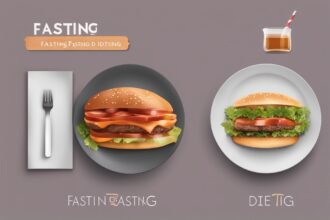In the quest for better health, weight loss, and overall wellness, many people find themselves torn between traditional dieting and newer approaches like intermittent fasting (IF). While both methods aim to improve health and body composition, they differ significantly in their approach and benefits. This post dives deep into Comparing Intermittent Fasting Benefits with those of conventional dieting, helping you make an informed decision about which path might suit your lifestyle and goals.
What Is Intermittent Fasting and How Does It Work?
Intermittent fasting is not a diet in the traditional sense but rather an eating pattern that alternates between periods of eating and fasting. Popular methods include the 16/8 method (fasting for 16 hours and eating during an 8-hour window) and the 5:2 method (eating normally for 5 days and restricting calories on 2 non-consecutive days). When comparing intermittent fasting benefits, one of the standout aspects is its focus on when you eat rather than what you eat, although food quality still matters for optimal results.
During fasting periods, the body shifts from using glucose as its primary energy source to burning stored fat, a process called ketosis. This metabolic switch is often cited as a key reason for IF’s effectiveness in weight loss and other health improvements. Unlike strict diets, IF offers flexibility, which can make it easier to sustain over time.
Traditional Dieting: A Structured Approach to Eating
Traditional dieting typically involves calorie restriction, portion control, or specific food group limitations (e.g., low-carb or low-fat diets). The focus is on reducing overall energy intake or altering macronutrient ratios to achieve weight loss or health goals. While effective for many, dieting often requires meticulous planning, tracking, and discipline, which can lead to frustration or burnout.
When comparing intermittent fasting benefits to dieting, it’s clear that diets often provide more structured guidelines but may lack the metabolic advantages that fasting can offer. Additionally, restrictive diets can sometimes lead to nutrient deficiencies if not carefully planned, whereas IF can be paired with a balanced eating style to avoid such pitfalls.
Comparing Intermittent Fasting Benefits for Weight Loss
One of the primary reasons people turn to intermittent fasting or dieting is weight loss. When comparing intermittent fasting benefits in this area, studies suggest that IF can be just as effective as continuous calorie restriction, if not more so, due to its impact on fat-burning hormones like insulin and norepinephrine. Fasting reduces insulin levels, promoting fat breakdown, while also potentially lowering overall calorie intake naturally due to the restricted eating window.
In contrast, traditional dieting focuses on a consistent calorie deficit, which can work well but often slows metabolism over time as the body adapts to lower energy intake. IF may help prevent this metabolic slowdown, making it a compelling option for sustainable weight loss. For more insights on weight loss strategies, check out our post on Effective Weight Loss Tips for Beginners.
Health Benefits: Intermittent Fasting vs. Dieting
Beyond weight loss, comparing intermittent fasting benefits reveals a range of health advantages that often surpass those of traditional dieting. IF has been linked to improved insulin sensitivity, reduced inflammation, and enhanced cellular repair processes like autophagy, where the body cleans out damaged cells. These benefits can lower the risk of chronic conditions such as type 2 diabetes and heart disease.
Traditional diets, especially those focused on whole foods (like the Mediterranean diet), also offer significant health benefits, including better cardiovascular health and improved nutrient intake. However, they may not trigger the same metabolic and cellular responses as fasting. If you’re curious about heart-healthy eating, explore our guide on Heart-Healthy Diets to Try.
Ease of Adherence and Lifestyle Fit
When comparing intermittent fasting benefits to dieting, ease of adherence is a critical factor. IF often feels less restrictive because it doesn’t require constant calorie counting or food group elimination. Many people find it simpler to skip meals or limit eating windows than to follow a rigid meal plan. This simplicity can lead to better long-term adherence, a key component of any successful health strategy.
On the other hand, traditional dieting may appeal to those who prefer structure and detailed guidance. However, the constant focus on “what” to eat can become mentally taxing, leading to diet fatigue. For tips on maintaining motivation, read our article on Staying Motivated with Your Health Goals.
Potential Downsides and Considerations
While comparing intermittent fasting benefits highlights many positives, it’s not without challenges. Some individuals may experience hunger, irritability, or fatigue during fasting periods, especially when starting out. IF may also not be suitable for everyone, such as pregnant women, individuals with certain medical conditions, or those with a history of eating disorders.
Traditional dieting has its own drawbacks, including the risk of yo-yo dieting, where weight is lost and regained repeatedly, often due to unsustainable restrictions. Both approaches require personalization and, ideally, consultation with a healthcare provider to ensure safety and effectiveness. For a deeper dive into personalized nutrition, see our post on Why Personalized Nutrition Plans Matter.
Disclaimer: The information provided in this article is for educational purposes only and should not be considered medical advice. Before starting intermittent fasting, traditional dieting, or any new health regimen, consult with a qualified healthcare professional or nutritionist to ensure it is safe and appropriate for your individual needs and conditions.
References
- Harvard Health: Intermittent Fasting: Surprising Update
- NCBI: Effects of Intermittent Fasting on Health, Aging, and Disease
- Mayo Clinic: Intermittent Fasting
- American Heart Association: Healthy Eating Plans
- WebMD: Intermittent Fasting Overview
This content is for informational purposes only and not a substitute for professional advice.






